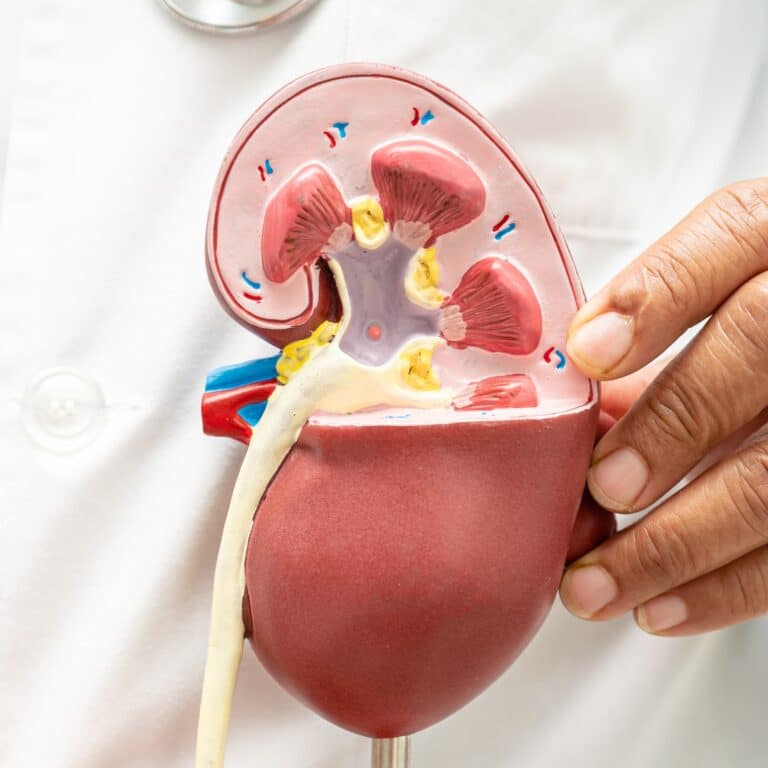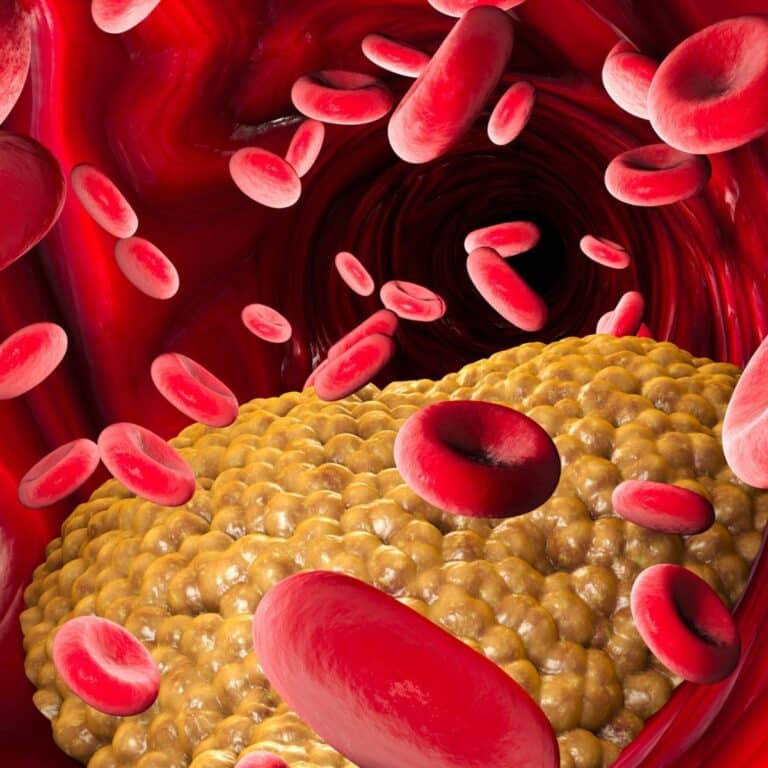How To Manage Chronic Kidney Disease
Are you or a loved one living with chronic kidney disease? Managing this long-lasting condition can feel overwhelming, but with the right tools and information, it is possible to maintain your health and independence.
If you're suffering from chronic kidney disease, management is a necessary way of life. From this point forward, it is essential to have a balanced diet, avoid extra fluid intake, and even manage the amount of exercise you get in an effort to sustain your health and maintain your independence to the greatest degree possible.
These are a few important chronic kidney disease management steps you must follow in order to sustain the best possible quality of life. Learning how to manage chronic kidney disease does get easier with time!
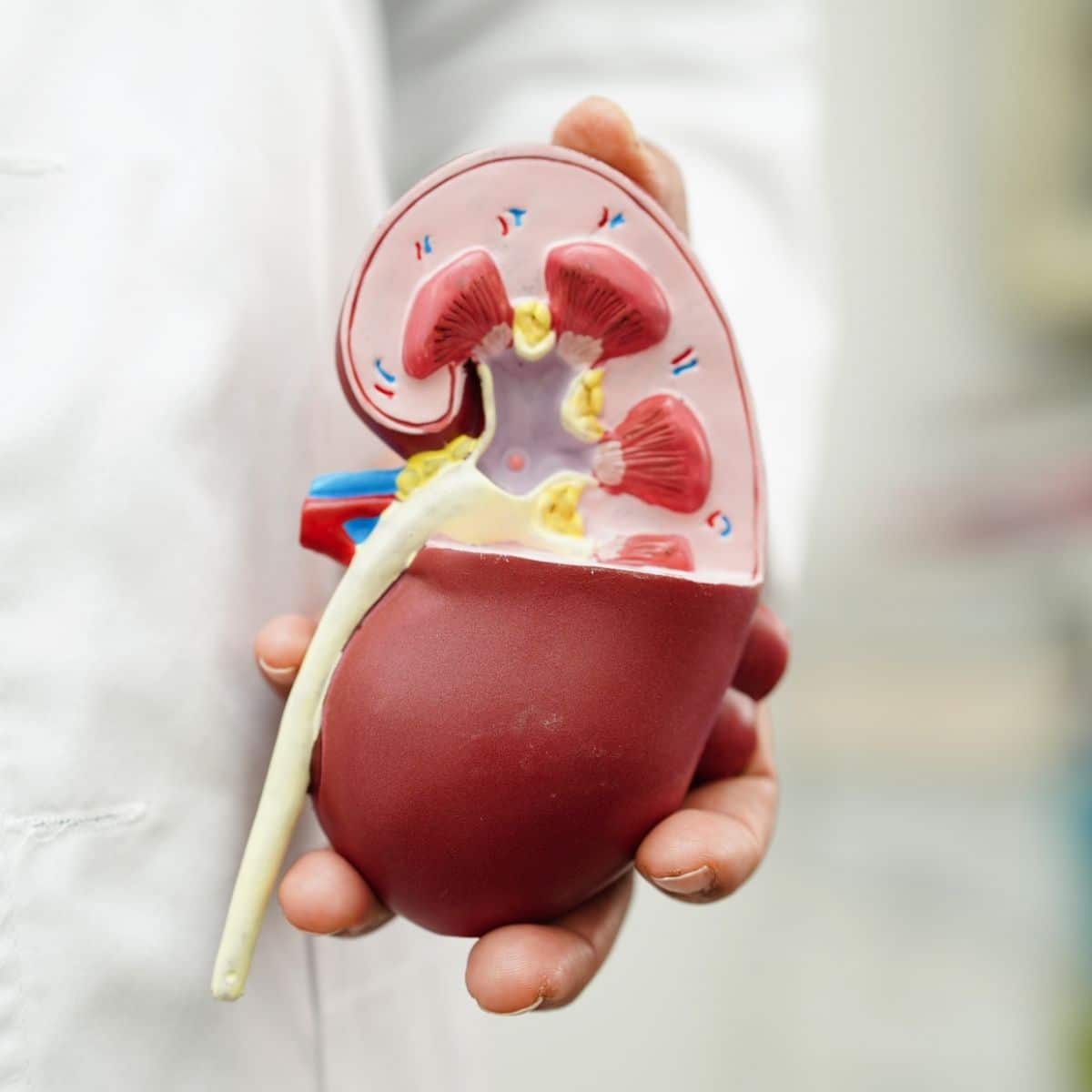
This article will provide you with tips on how to manage chronic kidney disease effectively, including managing coexisting conditions such as high blood pressure and diabetes, lifestyle changes, medication management, and coping mechanisms.
By taking these steps and working closely with healthcare professionals, you can take control of your health journey and live life to the fullest despite chronic kidney disease. You are also going to easily learn what not to eat on a renal diet.
Jump to:
- Key Takeaways
- Managing Blood Pressure
- Controlling Blood Glucose
- Monitoring Kidney Health
- Taking Medications as Prescribed
- Developing a Meal Plan
- Being Physically Active
- Maintaining a Healthy Weight
- Getting Enough Sleep
- Quitting Smoking
- Healthy Coping Mechanisms
- FAQs Chronic Kidney Disease Management
- Managing CKD Successfully
Key Takeaways
- Chronic kidney disease management requires long-lasting lifestyle changes that must be sustainable, and commitment to routines.
- Managing diet, fluids, and exercise is essential for maintaining health and independence, and creating routines for medication, diet, and exercise is critical.
- Focusing on foods you can have, such as fresh fruits and vegetables, is a positive way to approach the diet, and accommodating other dietary needs, such as diabetes, is important for successful chronic kidney disease management.
- Some ways to manage kidney disease include controlling blood pressure, meeting blood glucose goals (for those with diabetes), monitoring kidney health, taking medicines as prescribed, developing a meal plan with a dietitian, being physically active, maintaining a healthy body weight, getting enough sleep, quitting smoking, and finding healthy ways to cope with stress and depression.
For More Recipes and Ideas --->> Get Your Free Meals and Recipes That Are Perfect for Pre-Dialysis Diets, Pre-Dialysis with Diabetes, or Dialysis Diets.
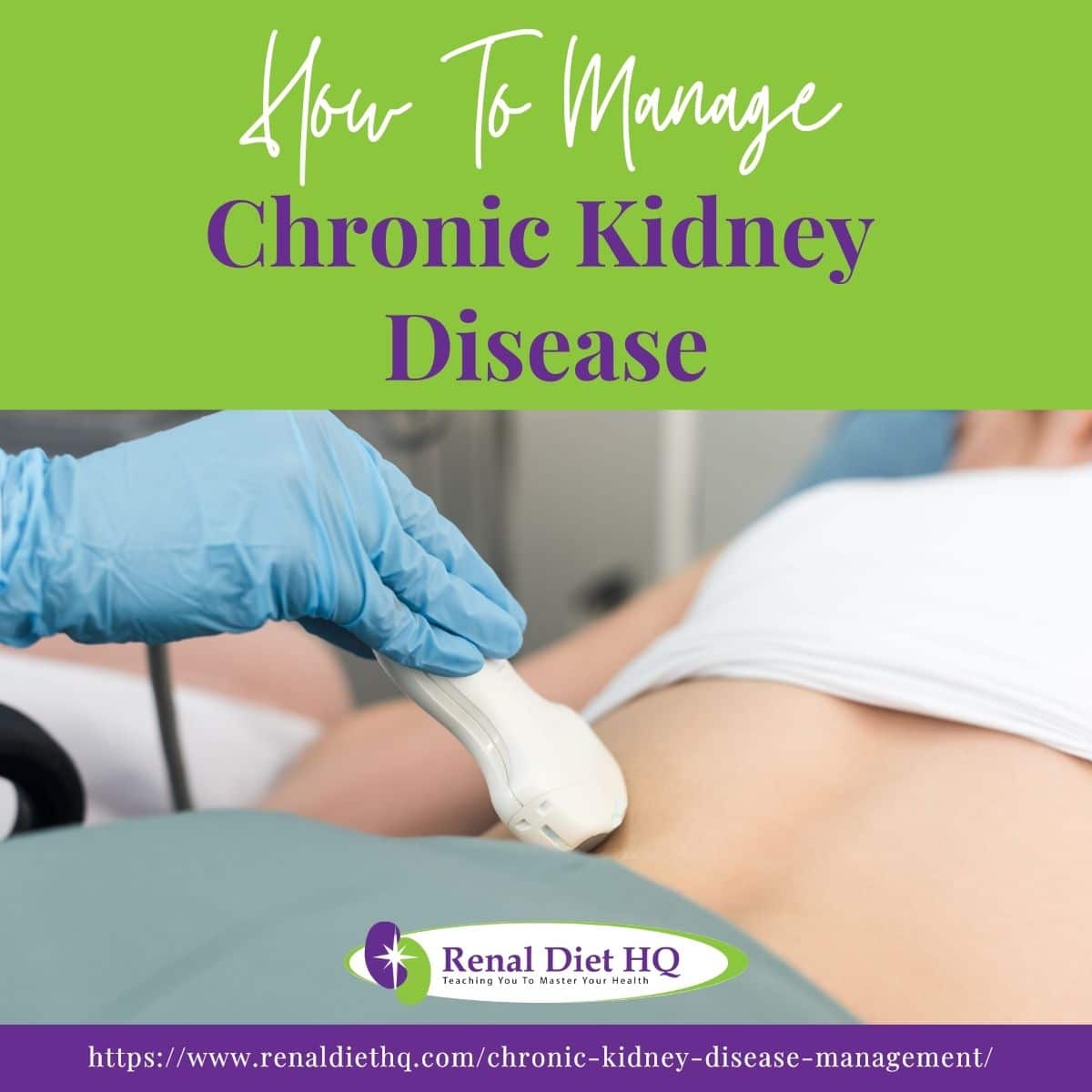
Managing Blood Pressure
Managing blood pressure is of utmost importance for kidney health, particularly for individuals with chronic kidney disease (CKD). Elevated blood pressure puts significant stress on the delicate blood vessels in the kidneys, leading to kidney damage and the progression of CKD to possible end stage kidney disease. By effectively managing blood pressure, the risk of kidney complications can be reduced.
Hypertension is a chronic condition that is well-known among the risk factors for kidney disease. Lowering blood pressure helps to preserve the kidney's filtration function and slows down the decline in kidney function. It also helps to minimize proteinuria, the presence of excess protein in the urine, which is a common sign of kidney damage.
Blood pressure medications such as angiotensin-converting enzyme (ACE) inhibitors and angiotensin II receptor blockers (ARBs) are commonly prescribed to control blood pressure and provide additional protection to the kidneys.
In addition to blood pressure medicines, lifestyle modifications play a crucial role in blood pressure management. These include adopting a healthy diet low in sodium, saturated fats, and cholesterol, engaging in regular physical activity, maintaining a healthy weight, limiting alcohol intake, and quitting smoking.
Regular monitoring of blood pressure levels and working closely with healthcare providers especially a kidney specialist to adjust treatment plans as needed is vital for individuals with CKD.
By having good blood pressure control, you not only take care of your renal function or decrease or slow the risk of progression to end-stage renal disease; you also preserve your cardiovascular health.
By effectively managing blood pressure, people with kidney disease can significantly reduce the risk of kidney complications, slow the progression of the disease, and improve overall kidney health.
Controlling Blood Glucose
Lowering your blood glucose levels is crucial to protecting your overall health and preventing further complications. Uncontrolled diabetes mellitus is one of the most common causes of chronic kidney disease since one of its common complications is diabetic nephropathy or diabetic kidney disease.
Hence, managing your blood glucose is essential and it requires a combination of dietary considerations, medication options, lifestyle changes, and monitoring techniques.
One way to ensure glycemic control is through dietary changes. A dietitian can help you create a meal plan that focuses on healthy foods such as fresh fruits and vegetables, lean proteins, and whole grains. It's important to monitor the amount of carbohydrates you consume as they directly impact your blood sugar levels.
Medication options are also available for managing blood glucose levels in people with kidney disease. Your healthcare provider may prescribe insulin or other medications that help regulate blood sugar levels. However, it's important to work closely with your healthcare team as some medications may need to be adjusted based on individual needs and kidney function (ckd and diabetes medications).
Monitoring techniques are essential for glycemic control in those with a diagnosis of kidney disease. Regular monitoring helps identify potential complications early on so that appropriate measures can be taken promptly. Potential complications include hyperglycemia (high blood sugar), hypoglycemia (low blood sugar), diabetic ketoacidosis (DKA), and hyperosmolar hyperglycemic state (HHS).
Managing chronic kidney disease requires a proactive approach towards controlling your blood glucose levels. By making necessary lifestyle changes, incorporating medication management strategies, working closely with healthcare providers and utilizing various monitoring techniques you'll be better equipped at managing this condition effectively.
Monitoring Kidney Health
Monitoring the health of your kidneys is crucial to safeguarding your overall well-being and preventing potential complications. Your kidneys play a critical role in filtering waste and excess fluid from your blood, regulating electrolyte levels, and producing hormones that help regulate blood pressure and red blood cell production.
Monitoring kidney function involves measuring tests for kidney disease like measuring urine output, as well as performing diagnostic tests such as blood tests, imaging studies, and biopsy.
Kidney function tests such as creatinine levels and electrolyte levels measure the level of waste products in your blood that should be removed by the kidneys.
Urine output measures how much urine you produce over a certain period of time. Imaging tests such as ultrasound or CT scan can help identify structural abnormalities in the kidneys.
Kidney biopsy involves taking a sample of kidney tissue to examine for signs of damage or abnormalities of kidney structure.
Regular monitoring can help detect changes in kidney function early on, allowing for lifestyle changes or preventive measures to slow or prevent further damage or progression of kidney disease.
Making lifestyle changes such as eating a healthy diet low in salt, sugar, and animal protein; maintaining a healthy weight; quitting smoking; controlling blood pressure and diabetes; staying hydrated; avoiding nephrotoxic medications; exercising regularly; managing stress; and getting enough sleep can also help promote kidney care.
Preventive measures include managing underlying conditions that may contribute to kidney disease development such as high blood pressure or diabetes, monitoring medication use with healthcare providers to avoid harmful interactions, and being proactive about seeking medical care for any symptoms of kidney disease. You might also want to learn about the benefits and effects of CBD for chronic kidney disease.
Taking Medications as Prescribed
Taking the right dose of medication at the appropriate times every day is like following a map to reach your desired destination. It's crucial for managing chronic kidney disease effectively. Adherence to medication is critical, but it can be challenging for some, especially if you experience side effects from certain drugs.
Here are some tips that can help you stay on track with your medications:
- Firstly, use medication reminders like alarms or smartphone apps. This will ensure that you never miss a dose.
- Secondly, make sure to keep an up-to-date list of all your medications and supplements so that you can avoid harmful interactions between them.
- Lastly, talk to your primary care provider before making any dose adjustments, taking any alternative therapies or over-the-counter medicines.
Remember that adherence to medication is essential for slowing the progression of chronic kidney disease and preventing complications. By using these tips, you can stay on top of your medications and improve your overall health outcomes. It's also important to know commonly prescribed medications for CKD.
Developing a Meal Plan
Creating a personalized meal plan is essential for maintaining health and independence while living with kidney issues. A registered dietitian can help you develop a renal-friendly meal plan that focuses on the right balance of nutrients and fluids to keep your kidneys functioning at their best. They'll work with you to find foods that fit your personal preferences and dietary needs.
Depending on your stage of chronic kidney disease, you may have to limit sodium consumption, reduce potassium intake, phosphorus levels, and follow fluid restriction.
Meal prep tips can also be helpful in managing chronic kidney disease. Preparing meals ahead of time can save time and energy, making it easier to stick to your meal plan. Try batch cooking recipes that freeze well, such as soups or stews, so you always have something on hand when you're short on time.
Nutritional supplements may also be recommended by your kidney specialist or dietitian to ensure you're getting all the necessary nutrients. Eating out strategies are important for socializing while still sticking to your meal plan. Look for restaurants that offer renal-friendly options or ask if they can accommodate special requests, such as steaming vegetables instead of sautéing them in butter.
Budget-friendly meal planning is also possible by choosing less expensive protein sources like beans or lentils and buying fruits and vegetables in season. With the right tools and guidance, developing a personalized meal plan can help manage chronic kidney disease and improve overall health.
Focus on Foods You Can Have
There are a lot of limits to consider when adapting to your chronic kidney disease management routine. It's easy to hyper focus on all the things you can't have anymore.
However, that's a negative way of thinking that often leads to depression, feelings of deprivation, and binging on things that aren't good for you. Instead, adopt a more positive attitude about all the great foods you can have like fresh fruit and vegetables, egg whites, fish, and more.
Keep your house well stocked with these foods as you develop your chronic kidney disease management plan and you'll find it more and more difficult to feel deprived.
Accommodate Other Dietary Needs
While it's great to get on board with your kidney-friendly diet, it's also important to accommodate other dietary needs you have.
For instance, if you have diabetes or other health conditions with special dietary needs like allergies or other sensitivities, you can't ignore them in an effort to focus on managing your kidney disease needs. You must find a balance between both needs or identify the more critical of the needs.
Avoid Dry Mouth
One of the worst aspects of rationing beverages is dry mouth. That's why it's so important to space your beverages apart in a manner that doesn't leave too much time between drinks. Keep this in mind as you adjust your chronic kidney disease management routine.
These are a few small things you can do to help combat dry mouth without significant consequences to your health and maintain your chronic kidney disease management efforts.
- Suck on ice chips
- Reduce sodium intake (renal diet sodium limit)
- Skip social drinking (save your beverage intake for times when you're thirsty instead)
- Chew sugarless gum
- Brush your teeth frequently throughout the day
- Avoid foods that make your mouth feel dry (consider fresh fruits like blueberries, strawberries, and raspberries instead of crackers or breads)
These are small changes but they significantly impact your level of discomfort due to dry mouth throughout the day.
Being Physically Active
Staying active is an important aspect of maintaining your overall health and independence when living with kidney issues. Exercise can help reduce the risk of developing other related health problems such as cardiovascular disease and diabetes. It can also improve circulation, strengthen muscles, and boost energy levels.
There are many types of physical activity you can engage in to manage chronic kidney disease. Walking, cycling, swimming, and even gentle yoga or stretching exercises are great options to consider. It's important to incorporate exercise into your daily routine gradually and start with activities that suit your fitness level.
For those with limited mobility, exercise modifications may be necessary. Chair-based exercises or water aerobics are low-impact options that can still provide cardiovascular (heart healthy lifestyle changes for CKD) benefits without putting too much strain on the body.
Additionally, it's crucial to stretch before and after exercising to prevent injury and reduce muscle soreness. Remember that staying active doesn't have to be overwhelming - start small and work your way up slowly for long-lasting success in managing your kidney disease.
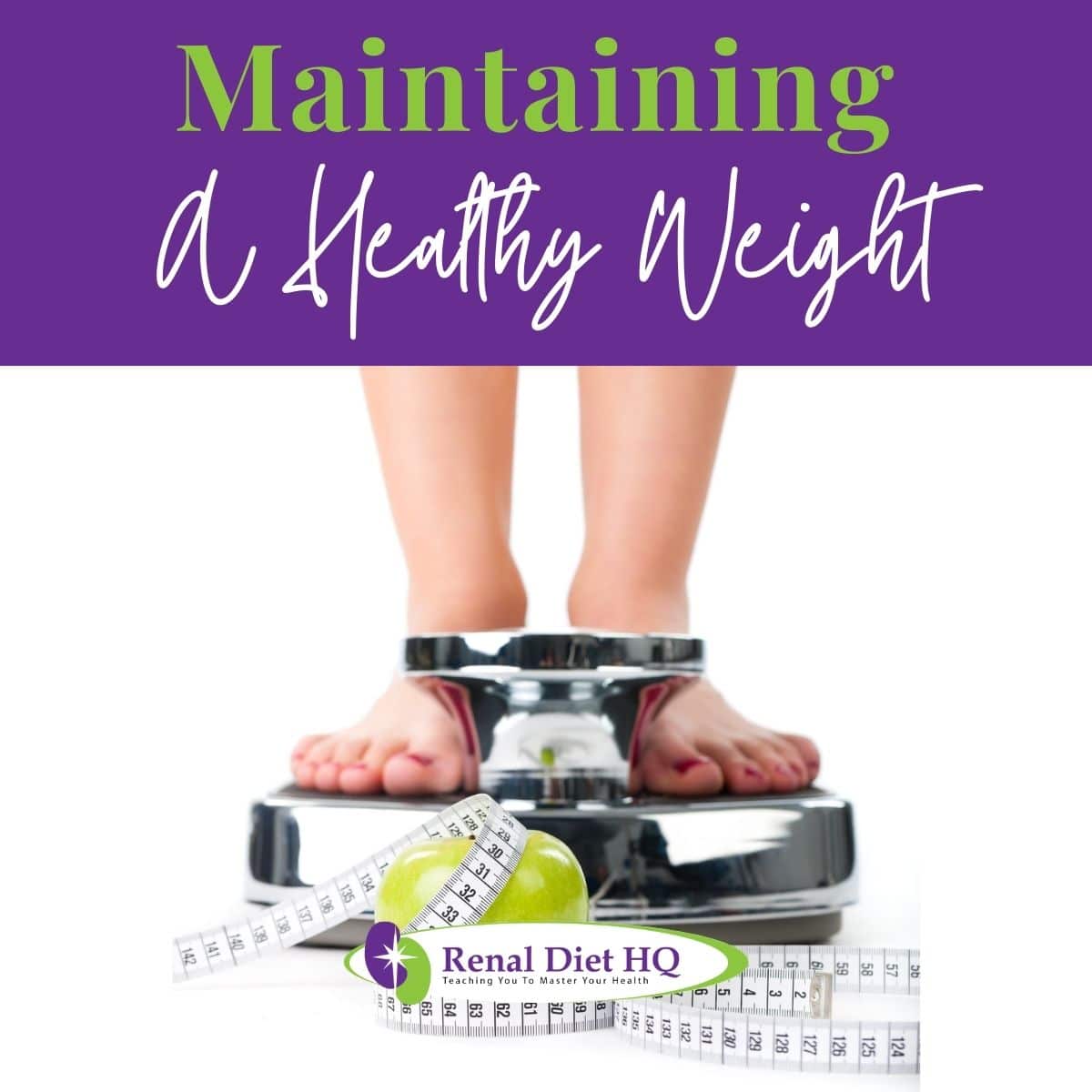
Maintaining a Healthy Weight
Here are some tips on how to maintain a healthy weight while managing chronic kidney disease:
- Incorporate exercise routines into your daily routine. Exercise can help improve muscle strength, increase energy levels, and reduce stress levels. It's important to choose low-impact exercises such as yoga or swimming that won't put too much strain on your kidneys.
- Mindful eating plays a crucial role in maintaining a healthy weight while managing chronic kidney disease. Focus on eating fresh fruits and vegetables and avoid processed foods that are high in sodium, potassium, and phosphorus. Consult with a dietitian to create an individualized meal plan that accommodates any dietary restrictions.
- Weight loss tips include reducing calorie intake by avoiding sugary drinks, limiting portion sizes, and avoiding late-night snacking.
- Healthy snacks can also help maintain a healthy weight while managing chronic kidney disease. Opt for snacks such as fresh fruit or unsalted nuts instead of sugary treats or salty chips which can be harmful to the kidneys.
Maintaining a healthy weight is critical when it comes to managing chronic kidney disease effectively over time. By incorporating exercise routines into your daily routine, following mindful eating habits, implementing effective weight loss strategies, and choosing healthy snacks, you can achieve optimal health outcomes while living with this condition for years to come!
Getting Enough Sleep
Make sure you prioritize getting enough sleep to support your overall health and well-being while managing chronic kidney disease. Lack of sleep can lead to increased fatigue, stress (how to reduce stress naturally), and difficulty managing your condition.
Here are some tips for improving your sleep:
- Creating a bedtime routine can help signal to your body that it's time for sleep. This could include activities such as taking a warm bath or shower, reading a book, or listening to calming music.
- Using such as deep breathing or progressive muscle relaxation can also help prepare your body for rest.
It's important to avoid caffeine before bed as it can interfere with falling asleep and staying asleep. Additionally, addressing any underlying sleep disorders, such as sleep apnea or restless leg syndrome, is crucial for improving sleep quality.
Talk to your healthcare provider about potential treatment options if you suspect you may have a sleep disorder. By prioritizing good sleep hygiene and addressing any issues that may be interfering with restful sleep, you can improve your overall health and better manage chronic kidney disease.
Quitting Smoking
Quitting smoking is crucial for improving your overall health and taking control of your future. Smoking has a negative impact on your kidney health, and can worsen chronic kidney disease symptoms. Cigarette smoking causes damage to the blood vessels that supply oxygen and nutrients to your kidneys, making them less efficient at filtering waste from your blood.
To quit smoking, there are several tips you can follow. One option is to try nicotine replacement therapy, which can help reduce cravings while you work towards quitting for good.
There are also support groups for smokers that can provide guidance and encouragement throughout the process. It's important to remember that quitting smoking is not easy, but it is worth it. By quitting, you'll be taking an important step towards managing your CKD and improving your overall health.
The benefits of quitting smoking extend beyond just kidney disease management. Quitting reduces the risk of heart disease, stroke, lung cancer, and many other health problems caused by smoking.
Additionally, by quitting smoking you'll be setting a positive example for those around you and reducing their exposure to secondhand smoke. So take the first step in managing your CKD today by committing to quit smoking – it may be difficult at first but will ultimately lead to better health outcomes for yourself as well as those around you.
| Effects of Smoking on Kidney Health | Tips for Quitting Smoking | Nicotine Replacement Therapy |
| Damages blood vessels supplying oxygen and nutrients to kidneys | - Set a quit date | - Nicotine gum or lozenges |
| Worsens CKD symptoms | - Avoid triggers like alcohol or caffeine | - Nicotine patch |
| Increases risk of developing CKD | - Try relaxation techniques like deep breathing or yoga | - Nicotine inhaler |
| Reduces effectiveness of treatments like dialysis or kidney transplant | - Consider medication to help with cravings | - Nicotine nasal spray |
Healthy Coping Mechanisms
To effectively cope with the challenges of chronic kidney disease, it's essential that you find healthy ways to manage stress and negative emotions.
Mindfulness exercises involve focusing on the present moment and using breathing techniques to calm the mind. This can help reduce stress and anxiety levels, which can be beneficial for those dealing with chronic kidney disease.
Support groups can also be a valuable resource for those looking to connect with others who have similar experiences. These groups offer a safe space where individuals can share their thoughts and feelings about living with chronic kidney disease.
Stress management techniques such as exercise, meditation, or deep breathing can also be helpful in managing chronic kidney disease. Relaxation techniques like yoga or massage may also be useful in reducing stress levels.
Finally, therapy options such as cognitive-behavioral therapy (CBT) or talk therapy can provide additional support for those struggling with depression or anxiety related to their condition.
By incorporating these healthy coping mechanisms into your daily routine, you may find that managing your chronic kidney disease becomes more manageable over time.
FAQs Chronic Kidney Disease Management
Prevalent misconceptions about chronic kidney disease and its management often revolve around dietary restrictions, medication management, exercise recommendations, and the importance of regular check-ups.
Many people believe that a kidney-friendly diet is excessively restrictive and difficult to follow, but in reality, it is manageable once you have adjusted to it.
Some also mistakenly think that medication can cure the disease or that skipping doses will not have long-term consequences. However, taking prescribed medicine regularly is crucial for managing symptoms and slowing down progression.
Additionally, some may assume that exercise is not recommended for those with kidney disease when in fact staying active can improve overall health outcomes.
Lastly, many fail to recognize the significance of routine laboratory exams for monitoring kidney function and making necessary adjustments to treatment plans.
By dispelling these misconceptions through education and open communication with healthcare providers, individuals can better manage their chronic kidney disease and maintain a good quality of life.
Unfortunately, chronic kidney disease can't be reversed or cured with lifestyle changes. However, lifestyle interventions like diet modification and exercise regimens can help slow the progression of the disease and manage its symptoms (ckd progression).
It's also important to follow medication management as prescribed by your healthcare provider and find stress reduction techniques that work for you.
Regular check-ups are crucial in monitoring the progression of the disease and making necessary adjustments to your treatment plan. While it may not be curable, managing chronic kidney disease through lifestyle changes and medical intervention can greatly improve quality of life for those affected.
Chronic kidney disease (CKD) can have a significant impact on mental health and well-being. The disease itself and the challenges associated with its management can lead to feelings of stress, anxiety, and depression.
The physical symptoms and lifestyle changes associated with CKD, such as fatigue, pain, dietary restrictions (renal diet restrictions), and the need for frequent medical appointments, can contribute to emotional distress.
The reliance on treatments like dialysis or kidney transplantation, along with the uncertainty of disease progression, can also cause psychological burden.
Furthermore, CKD-related factors like impaired kidney function and electrolyte imbalances can directly affect brain function and contribute to cognitive impairment and mood disorders.
It is important for healthcare providers to address the mental health needs of individuals with CKD through support, counseling, and interventions to improve overall well-being.
If you or a loved one has been affected by chronic kidney disease, there are resources available to help.
Support groups can provide emotional support and connect you with others who understand what you're going through. Financial assistance programs may be available to help cover the costs of treatment.
Education programs can provide valuable information on managing the disease and its symptoms. Dietary guidance from a registered dietitian is essential for maintaining health and independence.
Finally, medical referrals can connect you with healthcare providers who specialize in treating chronic kidney disease.
These resources can make a significant difference in your journey towards managing chronic kidney disease, so don't hesitate to reach out and take advantage of them.
Managing CKD Successfully
To effectively manage chronic kidney disease, it's essential to make lifestyle changes that prioritize your health and well-being. You must take control of your blood pressure (high blood pressure and kidney disease), blood glucose levels, and kidney health by adhering to medication regimens and developing a meal plan that meets your specific dietary needs.
Additionally, maintaining a healthy weight, getting enough sleep, quitting smoking, and finding healthy coping mechanisms are crucial for managing the condition. It can be overwhelming to receive a diagnosis of chronic kidney disease, but taking proactive steps towards managing the condition can help slow its progression.
By prioritizing your health through regular check-ups with healthcare professionals and making lifestyle changes that support kidney function, you can live a fulfilling life while managing chronic kidney disease.
Remember that self-care is an integral part of managing this condition, and seeking support from family members or mental health professionals may also be beneficial in reducing stress and depression associated with the diagnosis.
The key to successful chronic kidney disease management is creating a plan you can follow through day after day. This isn't a temporary management plan, but a long-lasting lifestyle change that must be sustainable.
To see one of my best selling books, "Living With Chronic Kidney Disease" Click Here









